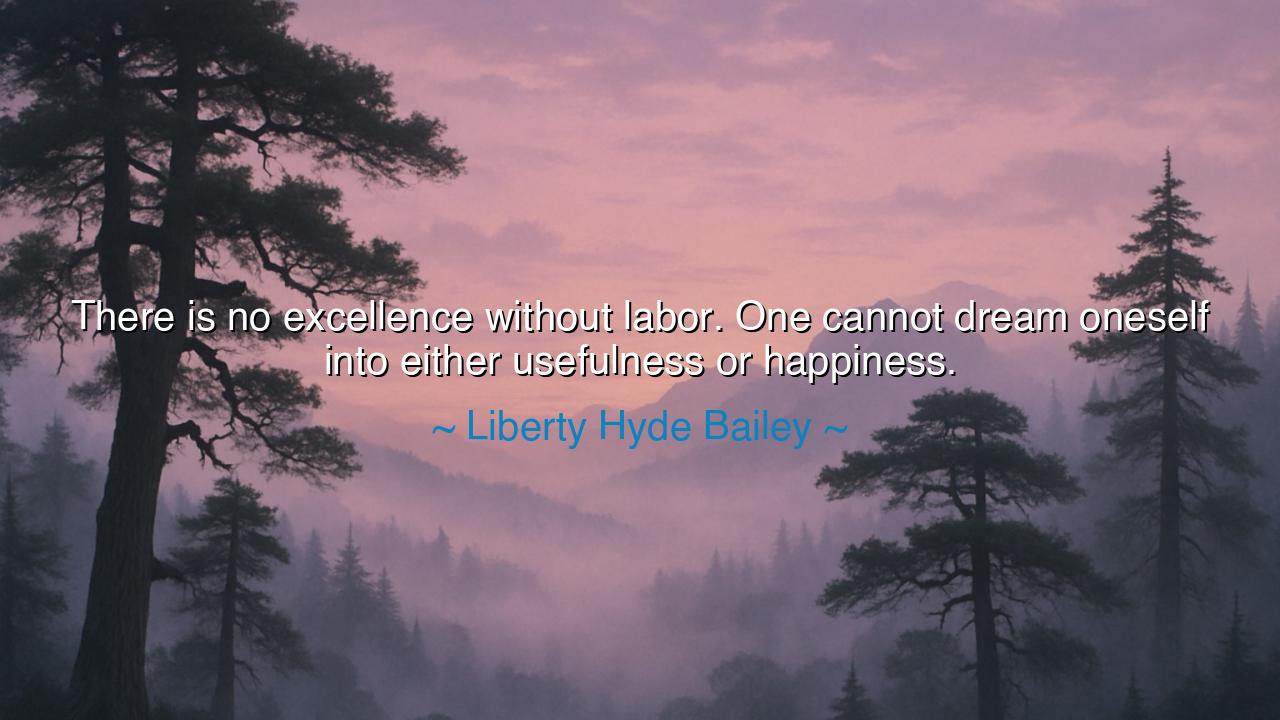
There is no excellence without labor. One cannot dream oneself
There is no excellence without labor. One cannot dream oneself into either usefulness or happiness.






When Liberty Hyde Bailey declared, “There is no excellence without labor. One cannot dream oneself into either usefulness or happiness,” he spoke as a prophet of industry and truth. These words, forged from the soil of honest work and the philosophy of self-reliance, stand as a rebuke to idleness and a hymn to effort. For in them lies a timeless lesson: that no greatness of spirit, no peace of heart, no mastery of craft can be attained by wish or fancy alone. Excellence is not born in the mind’s imagination, but in the hands that toil, the heart that endures, and the will that refuses to yield.
Bailey, a farmer, scientist, and philosopher of the early twentieth century, was a man who found wisdom not in ivory towers but in the living earth. He understood that labor—physical, intellectual, and moral—is the divine law that sustains both nature and humanity. As a pioneer of agricultural science, he saw how the soil, when worked with patience, yields fruit; and he knew that the human soul is no different. To him, labor was not a curse, but a sacred instrument of growth—the means by which the dream becomes real, and the dreamer becomes strong. Thus his quote stands as both warning and invitation: to dream is noble, but to work is holy.
Excellence, in Bailey’s view, is not a sudden gift bestowed upon a chosen few—it is the slow harvest of persistent effort. The artist who paints a masterpiece, the scholar who unlocks knowledge, the mother who raises her children in virtue—all earn their excellence through struggle. The ancients knew this truth well. Aristotle taught that virtue itself is a habit, built by repeated action. The Spartans drilled endlessly so that courage might become instinct. Even the poet, whose soul burns with vision, must labor over words as a mason over stone. For the dream, however bright, is powerless until shaped by discipline.
Consider the life of Thomas Edison, whose name is synonymous with invention. He failed hundreds of times before perfecting the electric light. When asked how he endured so many defeats, he replied, “I have not failed. I have just found ten thousand ways that won’t work.” Edison did not dream himself into excellence; he labored himself into it. His brilliance was not in the moment of inspiration, but in the patience of repetition. His life illustrates what Bailey meant: that usefulness and happiness come not from comfort or fantasy, but from the sweat of purpose.
To speak of happiness, Bailey adds, is to touch a truth deeper still. For just as one cannot be excellent without labor, one cannot be happy without it either. Idleness breeds restlessness; ease, when unearned, breeds emptiness. The soul longs to create, to build, to serve—to be of use. The farmer finds joy not in the finished harvest alone, but in the rhythm of the seasons; the craftsman delights not merely in the product, but in the process. The wise understand that labor itself is life’s great teacher, shaping the heart as it shapes the world. Happiness, then, is not a gift to be found, but a result to be earned.
Bailey’s words remind us that the modern dream of effortless success is an illusion. The gardens of the mind, like those of the earth, yield nothing to those who do not tend them. To “dream oneself into usefulness” is as futile as planting without plowing. Dreams must be wedded to work, vision to virtue, inspiration to endurance. For only through labor does the seed of aspiration grow into the tree of achievement.
Therefore, my children of thought and action, remember this: dream, but do not linger in dreams. Rise, and let your hands prove your vision. Whatever your craft or calling, give yourself wholly to it. In the fields of effort lie both excellence and happiness—the twin rewards of the diligent soul. Work not only for success, but for mastery; not only for gain, but for growth. For the man or woman who labors faithfully, every task becomes sacred, every hardship a teacher, and every day a step closer to the eternal joy of creation.
Thus, as Liberty Hyde Bailey taught, let labor be your prayer, and perseverance your creed. Dream, yes—but build your dream with your hands, shape it with your will, and water it with your tears if you must. For though the dreamer sleeps in comfort, it is the worker who wakes in triumph. And in the end, it is labor, not luck, that writes the name of the excellent upon the walls of eternity.






AAdministratorAdministrator
Welcome, honored guests. Please leave a comment, we will respond soon